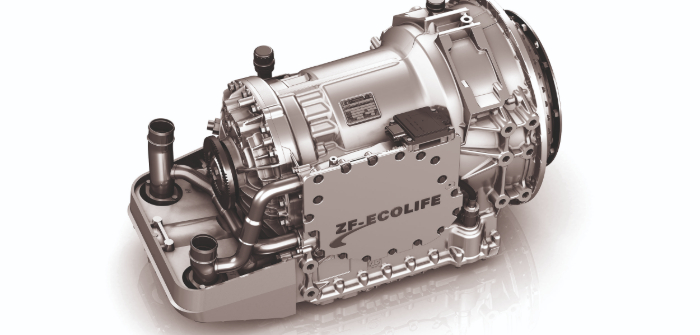ZF Friedrichshafen has reported that buses, coaches and fleets equipped with the company’s latest EcoLife transmission technology are benefitting from greater fuel efficiency. In trials on double-deck city buses that began last year, the ZF EcoLife 6-speed automatic transmission reportedly delivered an mpg saving of up to 16%.
The ZF EcoLife transmission is said to have achieved real mpg data of over 10.5mpg, thanks to its maturing technologies. A standard vehicle of a similar set-up offers around 9mpg on average, with double-deck vehicles typically aero-dynamically challenged due to their design, meaning this difference to the fuel consumption could be significant.
The average weekly fuel usage of a medium-size operation of up to 150 vehicles, according to ZF, equates to 60,000 liters of fuel, adding up to around £42,000 (US$55,000) per week expenditure. As a result, the 16% fleet annual saving claimed by ZF would equate to around £75,000 (US$97,750).
The fuel trial figures are measured using ZF’s own cloud-based system OpenMatics as well as a separate system used by a customer to monitor fuel data, and ZF said the systems are accurately comparable.
David Wakeling, head of commercial vehicle, manager ZF Aftermarket, said, “This is an incredible achievement for our EcoLife transmission. Fuel that is actually used in operation directly relates to the bottom line of any bus operator and it’s therefore important to measure fuel consumption this way to achieve accurate and realistic results.”
The ZF EcoLife 6-speed automatic transmission’s stop/start function allows for an unlimited number of stops and restarts, even after extended engine standstill, for instance, due to heavy traffic. In designing the second-generation ZF EcoLife transmission, engineers adapted the existing hydraulic system to exploit the pressure stored in the primary retarder oil accumulator.
ZF says that the integrated primary retarder provides a leading wear-free braking performance down to a near standstill. This extends the lifecycle of the vehicle service brakes and protects the environment thanks to a reduction in brake dust.
The noise pollution aspect is well documented by DEKRA as being a key advantage of the EcoLife product, both from pedestrian and passenger perspectives. This is thanks to helical-cut gears and six optimized ratio steps, combined with ZF’s TopoDyn Life transmission control software, reducing engine speeds across the complete driving cycle of the vehicle. This is said to not only lower exhaust emission levels, but also minimise noise across the vehicle speed range.
Designed to cope with an ever-demanding operational environment, ZF EcoLife is suited for application from a midi bus to 26-metric ton double deck in city or intercity operation.


